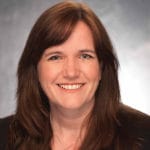CGU Students Help City of Los Angeles Make Data-Driven Decisions

Running a huge city like Los Angeles means asking lots of questions: Does public art near public facilities have a measurable impact? How can LA monitor and improve the way city streets are paved and maintained? Should the finance department reconsider the way it audits business taxes?
CGU is helping to find data-driven answers.
Faculty and students from the Center for Information Systems & Technology (CISAT) recently collaborated on several projects seeking to solve some of LA’s pressing problems, thanks to a unique partnership created by a high-profile alumna with extensive expertise in education, innovation, and government service.

CISAT alumna Jeanne Holm ’01, the senior technology advisor to Los Angeles Mayor Eric Garcetti, created Los Angeles’ Data Science Federation, an initiative that pairs universities with city departments interested in using predictive models and analysis to help them address problems in the nation’s second most-populous city.
This past spring, Professors Yan Li and Lorne Olfman and 21 students—all from CISAT except for one from the Drucker School of Management and one from Keck Graduate Institute—analyzed city datasets on public art, street paving, and business tax audits to come up with a series of recommendations and reports presented to Los Angeles managers.
“The city officials were impressed with the reports and believe that the findings will be useful,” said Olfman, who also serves as CISAT’s acting director. “Plans are in process to continue this partnership.”
The students’ projects were tied to CISAT’s “Data Analytics & Information Visualization” course.
The work included:
- An analysis of the city’s auditing activities to determine unusual patterns and relationships between types of businesses and amounts of business taxes collected.
- A model that tracks and measures the social, cultural, and economic impacts of city-funded art projects.
- A dashboard that could provide LA’s street maintenance division with real-time updates and help them evaluate how well their paving and milling crews are performing.
“This partnership allows students to apply the knowledge they are learning to solve real organizational problems,” Olfman said. “Moreover, the City of Los Angeles will offer students opportunities for internships and employment.”
The goal of LA’s Data Science Federation is tackling “tough city problems that will make a difference in many areas and expand on early work in data science and data-driven decision making for city government.”
The federation was launched by Holm, the deputy chief information officer for Los Angeles’ Information Technology Agency. As NASA/JPL’s chief knowledge architect, she created an award-winning NASA portal. She was also an evangelist for the White House open data initiative, helping to build communities and introduce new technologies in partnership with the public, educators, developers, and international and city governments.
Holm most recently worked with the World Bank to create tech startup cultures and improve government practices in education, health, agriculture, and social justice in Sierra Leone and Uganda. She is a Fellow of the United Nations International Academy of Astronautics.